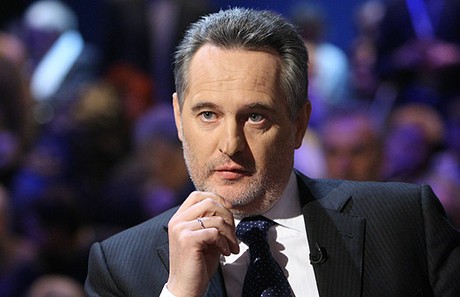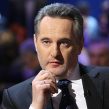
Dmytro Firtash Launches New Opaque Gas Intermediary
Publication: Eurasia Daily Monitor Volume: 10 Issue: 55
By:

For 20 out of the 22 years of Ukraine’s independence (with the exception of the period 2009–2010), the country’s domestic energy market has been dominated by opaque gas intermediaries. Gazprom’s Itera and Yulia Tymoshenko’s United Energy Systems of Ukraine operated during the first decade of Ukrainian independence and were replaced by Dmytro Firtash’s Eural-Trans Gas (ETG) and RosUkrEnergo (RUE) in the second decade. These have now been replaced in the third decade by Firtash’s OstChem, which Ukrainian journalist Alla Yeremenko described as “RosUkrEnergo—Take Two” (https://gazeta.dt.ua/ECONOMICS/rosukrenergo__dubl_dva.html).
RUE provided Gazprom with indirect access to Ukraine’s domestic gas market through UkrGasEnergo, a joint venture created by Ukraine’s state gas company Naftohaz Ukrayiny and RUE. In March 2008, then–Prime Minister Tymoshenko re-established Naftohaz’s monopoly over domestic sales by removing UkrGazEnergo. The January 2009 gas contract, which settled the Russian-Ukrainian natural gas dispute, established for the first time a direct gas sale relationship between Gazprom and Naftohaz by removing RUE’s intermediary role.
OstChem Gas Trading AG, part of Firtash’s DF Group business empire, was established in 2011 as his third gas intermediary and was registered in Switzerland in December 2012. RUE and Centragas (see below) were also registered in Switzerland and European Union member country Austria.
OstChem is currently holding negotiations with Turkmenistan and Kazakhstan to supply Ukraine with gas at a lower price than that paid by Naftohaz under the 2009 contract. OstChem will import 8.124 billion cubic meters (bcm) of gas this year, up from 6 bcm last year when it paid $280 per thousand cubic meters—far less than the $430 paid by Naftohaz. In 2013, OstChem will supply nearly a third of the gas used by industrial users and is planning to increase its gas imports to 12 billion bcm (Kommersant-Ukraine, December 21, 2012).
Firtash’s investment in Yanukovych’s 2010 election campaign paid dividends and his business empire doubled in size in 2010–2012 while his capital assets “grew at a fantastic rate” by 540 percent. Within a year of Yanukovych’s election, Firtash’s fortune soared from $354 million to $2.25 billion (Korrespondent, November 11, 2011).
Firtash was permitted to purchase additional large chemical plants and increased his control over mineral fertilizer plants—from owning one in 2010 (RivneAzot) to acquiring most of them by 2011. OstChem combines four Ukrainian gas guzzling nitrogen fertilizer producers—Nitrogen, Stirol concern, Severodonetsk Nitrogen and Rovnoazot (on Firtash’s growing business empire see https://gazeta.dt.ua/ECONOMICS/byudzhetna_godivnitsya__dlya_gazovogo_oligarha.html).
In August–September 2012, the Nikolai Azarov government permitted Firtash’s DF Group to purchase at reduced prices state shares in 12 regional gas companies that market natural gas to the public. In October 2012, the government cancelled the 2008 Tymoshenko government resolution, which had re-established Naftohaz’s monopoly on domestic sales, instead opening the door to the domestic market for Firtash. In December 2012, the same month OstChem was registered in Switzerland, Naftohaz head Yevhen Bakulin proposed permitting middlemen into Ukraine’s gas market to sell gas profitably to industries, while Naftohaz would continue to supply unprofitable (highly subsidized) residential customers.
There are two reasons why Firtash has been more successful than Naftohaz at receiving a lower gas price.
Firstly, Firtash’s gas intermediaries have all by-passed Naftohaz and profits went to the “gas lobby” instead of to the Ukrainian state. While the Russian state gained from RUE through Gazprom which had a 50-percent share, the Ukrainian state received nothing from RUE as the Ukrainian 50-percent ownership stake actually belonged to the Swiss registered company Centragas, which is owned by Firtash (90 percent) and Ivan Fursin (10 percent)—consequently, the two men owned 45 and 5 percent of shares in RUE, respectively (https://www.pravda.com.ua/articles/2012/01/19/6919527/).
Fursin’s five-percent share was a front for other beneficiaries, including former President Leonid Kuchma (who together with President Vladimir Putin established RUE in July 2004) and former senior advisor Serhiy Levochkin who has been Viktor Yanukovych’s chief of staff since 2010. Fursin and Levochkin were school friends and worked together at Bankivskyy Dim (Banking House) in the 1990s. Fursin is the owner of the Odessa-based Misto Bank (City Bank) where Yulia Levochkin was deputy head of investment banking in 2003–2007 (https://www.pravda.com.ua/articles/2012/01/19/6919527/). Yulia Levochlin and Fursin are Party of Regions deputies.
Secondly, this was a policy of deception as Firtash and Yuriy Boyko are members of Ukraine’s pro-Russian “gas lobby” and both have excellent contacts in Moscow. Boyko was minister for fuel and coal industry in the first Azarov government (2010–2012), and Naftohaz head Bakulin is Boyko’s ally (Boyko was head of Naftohaz in 2002–2004 and was intricately involved in the launching of RUE). Energy Minister Boyko undertook virtual negotiations for a discount on the 2009 contract gas price while Firtash concluded negotiations for discounted gas through OstChem. In return for discounted gas prices beneficial to OstChem, Gazprom was re-allowed to enter Ukraine’s domestic gas market (Kommersant-Ukraina, October 16, 2012). Some of the local gas companies purchased by Firtash have been re-sold to Gazprom (Komentarii, September 22, 2012).
OstChem is the latest example of high-level gas corruption in Ukraine that is again assisted by poor due diligence in the EU and Switzerland, which have never—unlike the United States—pressured Ukraine to clean up its opaque energy sector. Poor EU due diligence fails to sanction energy corruption in Ukraine and undermines the EU’s “enlargement-lite” policy of integration through an Association Agreement and Deep and Comprehensive Free Trade Agreement. The EU’s disinterest in energy due diligence in Ukraine also strengthens Firtash—whom lb.ua journalists Dmitry Kuzmin and Evgeny Magda have labeled a “Russian agent of influence” (www.lb.ua, May 26, 2011)—and the pro-Russian “gas lobby” within the Yanukovych administration and Party of Regions who seek, such as through the imprisonment of Tymoshenko, to undermine Ukraine’s European integration (Ukrayinskyy Tyzhden, November 17, 2012).
It is little wonder that the Yanukovych administration and Ukraine’s oligarchs are cynically disposed toward the EU, which fails to uphold the principles of good governance it espouses when dealing with non-members. Meanwhile, the Yanukovych administration fears the US, which alone has been more demanding of Ukraine in calling for greater transparency in that country’s energy sector.




